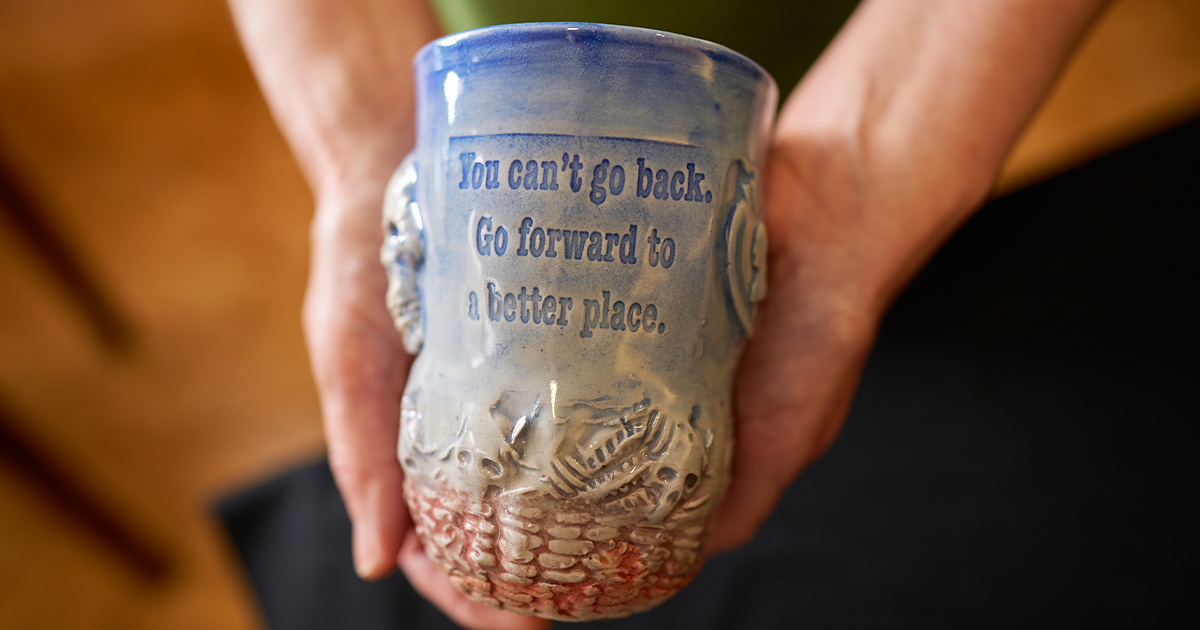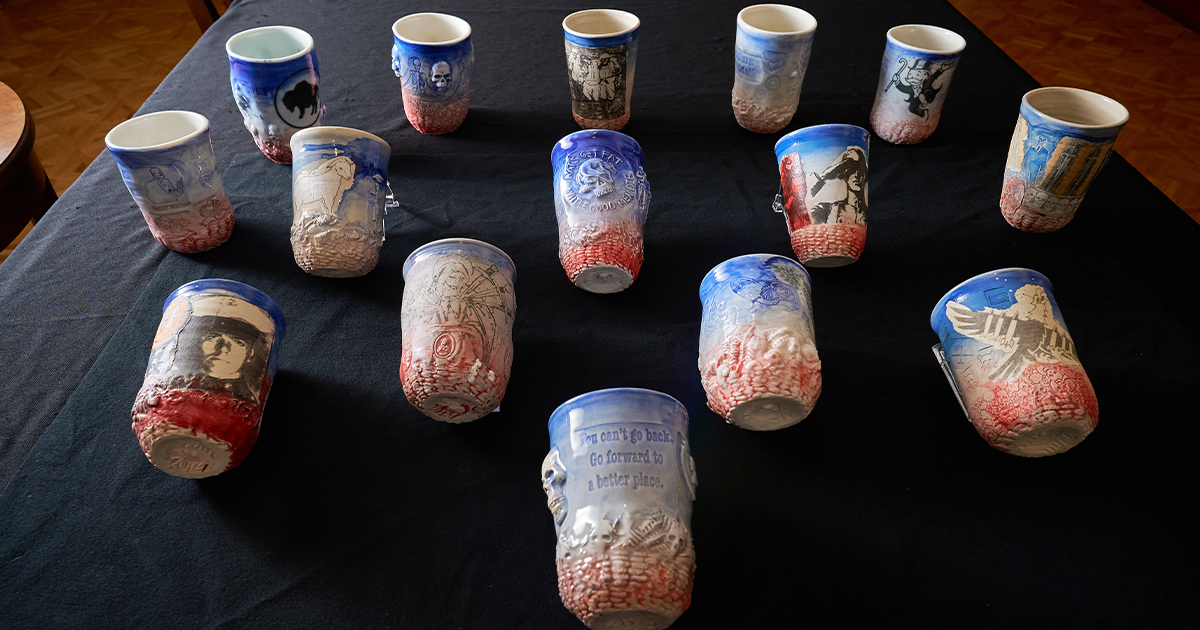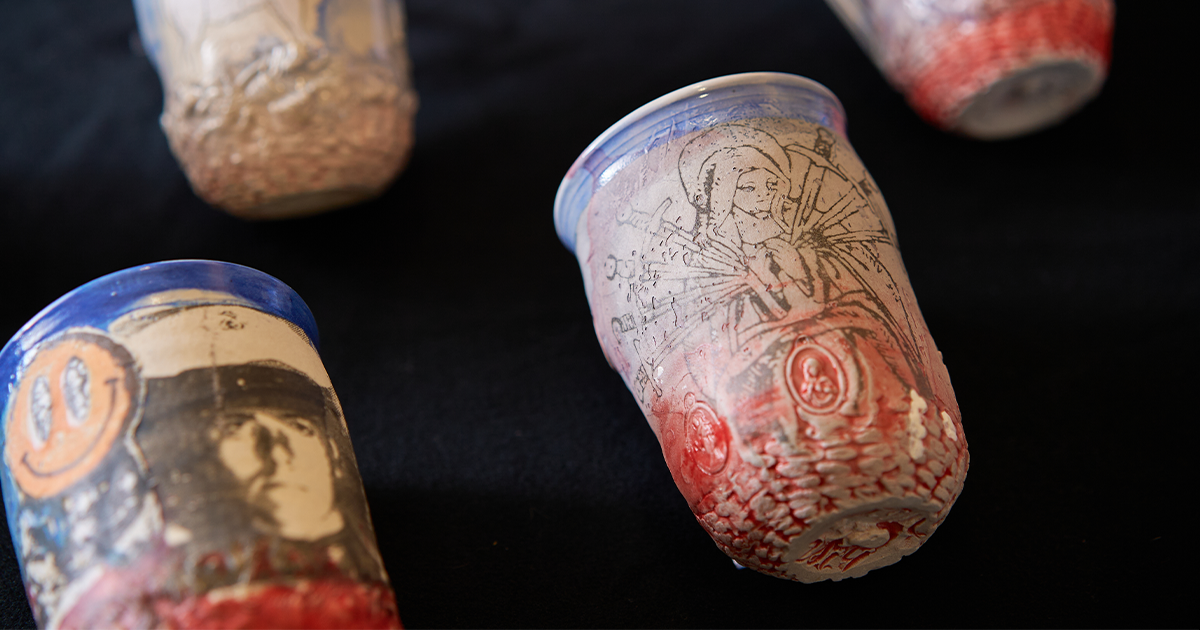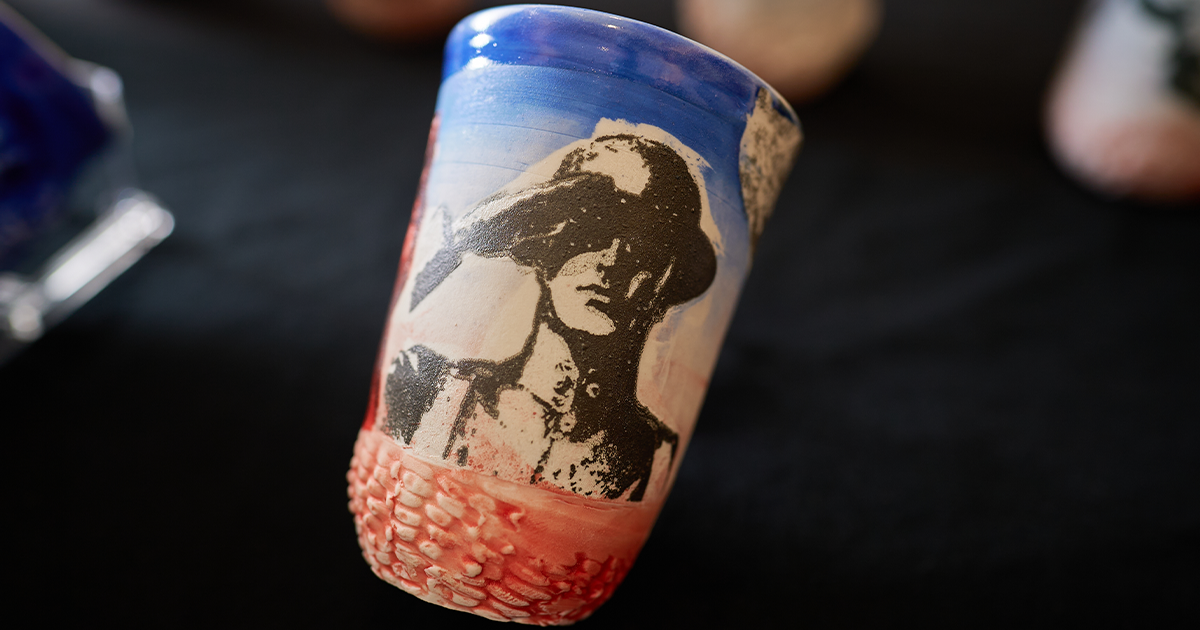La Salle University
At Connelly Library, a conversation-starter around mental health
A set of 15 hand-spun ceramic cups—a unique entry in La Salle’s Special Collections—is on display during Mental Health Awareness Month.
Holding a ceramic cup in her hands, Heather Willever-Farr, Ph.D., moved it gingerly from one hand to the other. She operated at a deliberately slow pace.
If her role as a special collections librarian at La Salle University has taught her anything, it’s that you must always maintain a delicate touch. (After all, handling valuable and sometimes one-of-a-kind items is a regular occurrence.)
“These,” she said, “are special pieces.”
In recognition of Mental Health Awareness Month, La Salle’s Connelly Library will showcase the ceramic work of artist Ehren Tool.
Tool is the ceramics senior laboratory mechanician at University of California, Berkeley. A veteran of the U.S. Marine Corps, Tool served in the 1991 Gulf War. He has earned global acclaim for his ceramic cups, each vividly depicting images of war. They feature grenades and high-powered artillery, skulls and skeletons, and military personnel in combat. Others are stamped with powerful messages about the trauma inflicted by military service.
Since 2001, Tool has made and donated more than 22,000 cups—including the 15 that are housed in the Special Collections at La Salle’s Connelly Library.
No other university or museum in Philadelphia has Tool’s cups in their permanent collections, Willever-Farr said. A former officer in the U.S. Army, she knows the toll of military service upon an individual and a family. Two of her uncles served in the Vietnam War “and it scarred them for life,” she said.
“Ehren’s cups depict bloodshed. War involves death and he does not shy away from that,” said Willever-Farr. “One of the interesting things about his art is there’s a cynicism in what words are included on his cups. There is this ‘oorah’ military aspect about them that, as a veteran, he is coming to terms with and being critical of. His cups evoke that. It’s a complex relationship and complex messaging, which makes his art unique.”
Tool’s cups are handmade in his California studio, spun one at a time using a pottery wheel and transformed from balls of clay into unique art pieces imprinted with stamps he carefully designs.
The collection at La Salle includes cups that are clay-colored, with varying shades of red, white, and blue. Some feature juxtaposed images of a lamb—a universal figure of peace—beside wartime scenes. Others are emblazoned with messages like, ‘You can’t go back. Go forward to a better place.’
No other university or museum in Philadelphia has Tool’s cups in their permanent collections.
A study by the National Institute of Health (NIH) surveyed more than 60,000 Iraq and Afghanistan veterans. Of them, nearly 14% screened positive for post-traumatic stress disorder. The NIH study said that percentage might actually undercount the true figure, with more than a half-million veterans of those wars potentially suffering from PTSD.
Celebrated annually each May, Mental Health Awareness Month aims to raise awareness of those living mental illness while also combatting the related stigma through support systems, educational tools, and other related resources.
“When our military servicepeople are deployed in conflict and war zones, they often experience unfathomable threats and trauma,” said La Salle associate professor of psychology Megan Spokas, Ph.D., an expert on anxiety disorders and a person’s reactions to trauma. “A collection like this can help us all contemplate the experiences of those who have served in our country’s armed forces and increase our understanding of their struggles. What’s also important to know is that social support from one’s family, friends, and larger community can impact service people in meaningful ways. It can promote resiliency and create a buffer against conditions like PTSD and depression. So I often think of collections like this as a way to increase awareness, as well as a way to garner support and connectedness within a community.”
Tool’s cups, in Willever-Farr’s words, “are intended to encourage dialogue around war. Those who survive war-induced trauma don’t always want to talk about it. It’s easy to forget what our soldiers are experiencing. Ehren, as a veteran, understands the opaque nature of military service and its impact on people and families.”
“The ripple effect of trauma can be passed person to person, generation to generation,” Willever-Farr continued. “There’s great intensity in those experiences and war, with significant violence, can elicit reactions and experiences that inflict trauma. Ehren’s cups call you to consider the conflict of war and the healing required for veterans. He is asking you to explore what these individuals have gone through and reminding you to be kind to them as they heal.”
—Christopher A. Vito



